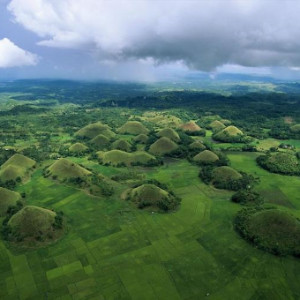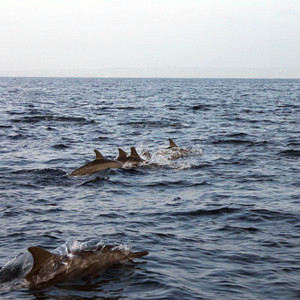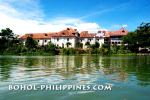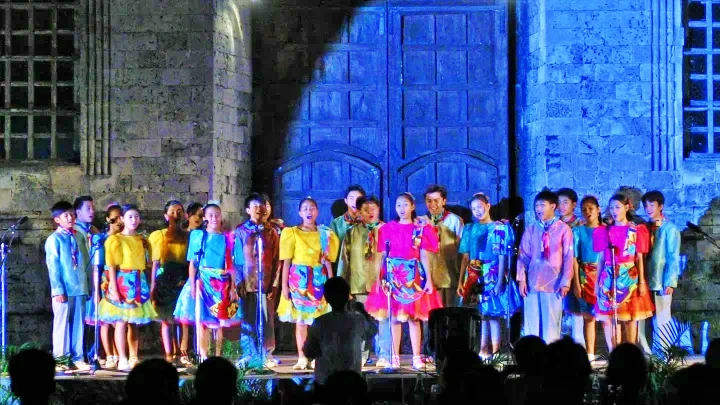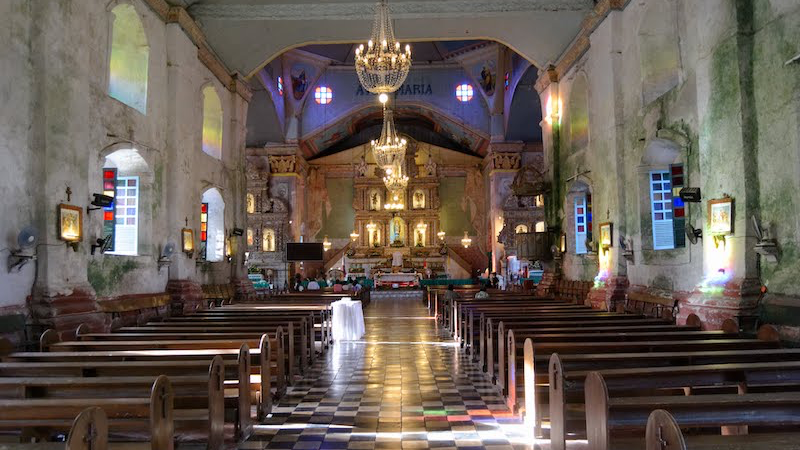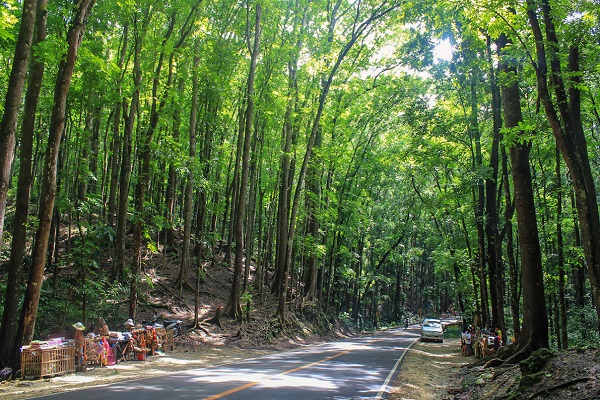- Bohol
- Bohol Travel
- Getting There
- Panglao Ariport
Panglao Airport and Sustainable Tourism : A Harmonious Partnership
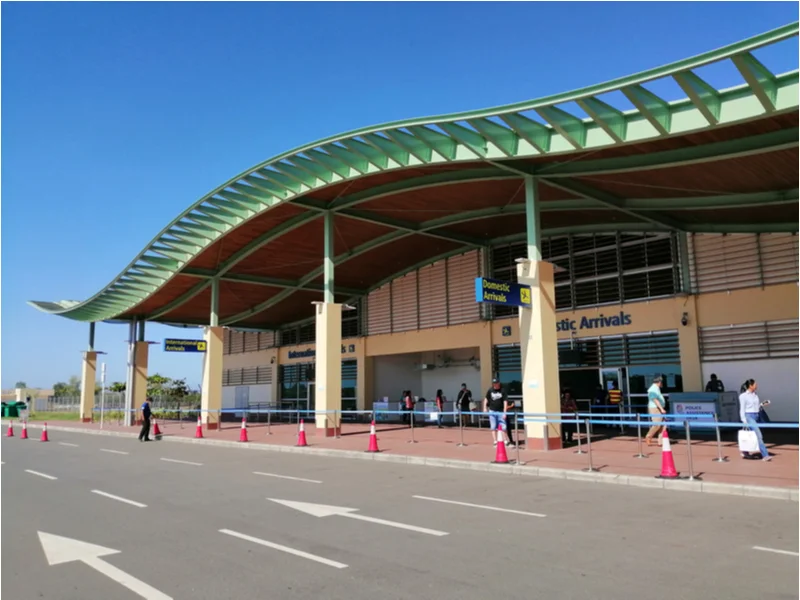
Secure your Cebu Bohol ferry tickets today to start your unforgettable journey!
Panglao Island, located in Bohol province in the Philippines, is known for its pristine diving sites and relaxed atmosphere. As the island plans to attract more visitors, it is also dedicated to preserving its low-impact way of life and embracing sustainability.
At the heart of this commitment is the Bohol-Panglao International Airport, touted as the country's first eco-airport and the "green gateway" to the province.
The airport incorporates eco-friendly features such as solar panels for a third of its electricity, natural ventilation to reduce air conditioning, and advanced water and waste management systems.
With a runway currently measuring 2,500 meters (soon to be extended to 2,800 meters), the airport welcomed 357,000 tourists in 2022 and expects that number to double to 700,000 in 2023.
While the majority of arrivals are domestic, efforts are being made to attract more international flights.
A. Overview of the topic: Sustainable Tourism and Panglao Airport
Sustainable tourism has emerged as a vital concept in the travel industry, emphasizing the need to protect and preserve the environment, culture, and communities in destinations worldwide. It is a responsible approach to tourism that aims to minimize negative impacts while maximizing the positive contributions to local economies and the well-being of residents. Panglao Airport, located in the picturesque Panglao Island in the Philippines, is at the forefront of promoting sustainable tourism practices. By adopting environmentally-friendly initiatives and engaging with local communities, Panglao Airport is playing a crucial role in ensuring the long-term preservation of the island's natural wonders.
Recommended Bohol Philippines Tours
[ Bohol Sight Seeing Day Trips - Check Out Availability ]
[ Full Day Cruise and Sailing Tours - Check out Availability ]
[ Full Day Adventure Tours - Check out Availability ]
Discover more of Bohol's natural wonders through our recommended tours. Click on the links below to embark on unforgettable adventures:
Ready to explore the beautiful islands of Cebu and Bohol? Secure your ferry tickets today through 12go and start your unforgettable journey!
B. Importance of sustainable tourism for preserving natural wonders
Preserving the natural wonders of Panglao Island is of paramount importance. The island boasts pristine white-sand beaches, vibrant coral reefs, and lush tropical forests that are home to diverse flora and fauna. However, the rapid growth of tourism can pose significant threats to these fragile ecosystems. Unsustainable practices, such as overdevelopment, pollution, and habitat destruction, can irreversibly damage the very attractions that draw visitors to the island. Sustainable tourism offers a solution by promoting responsible practices that minimize environmental impacts, conserve biodiversity, and maintain the ecological balance. By embracing sustainable tourism, Panglao Island can continue to enchant visitors for generations to come.
C. Introduction to Panglao Airport and its role in promoting sustainable practices
Panglao Airport serves as an essential gateway to the stunning beauty of Panglao Island and its surrounding attractions. Recognizing its pivotal position, the airport has taken on the responsibility of promoting sustainable practices within the tourism industry. Panglao Airport has implemented a range of initiatives that prioritize environmental conservation, waste management, community engagement, and education. These efforts are aimed at creating a harmonious partnership between tourism development and the preservation of the island's natural wonders. By adopting sustainable practices, Panglao Airport aims to inspire travelers, local communities, and industry stakeholders to embrace responsible tourism and collectively safeguard the island's precious resources.
As we delve deeper into the sustainable initiatives undertaken by Panglao Airport, we will uncover the specific measures implemented to promote eco-friendly infrastructure, waste management, community engagement, and biodiversity conservation. Through these efforts, Panglao Airport is striving to create a model of responsible and ethical tourism that can serve as an inspiration for destinations worldwide. By fostering a harmonious partnership between sustainable tourism and Panglao Airport, we can ensure that future generations can continue to experience the awe-inspiring natural wonders of this paradise island.
Getting There and Around
Eco-Friendly Infrastructure at Panglao Airport
A. Description of eco-friendly design and construction
Panglao Airport stands as a shining example of sustainable infrastructure with its eco-friendly design and construction. From the early stages of planning, environmental considerations were integrated into every aspect of the airport's development. The airport's architecture seamlessly blends with the natural surroundings, incorporating elements that minimize the impact on the environment. Low-profile structures, natural materials, and earth-tone colors ensure that the airport harmoniously coexists with the island's scenic beauty.
During the construction phase, sustainable building practices were employed. Strict guidelines were followed to reduce waste generation, recycle construction materials, and minimize carbon emissions. Efforts were made to protect and preserve existing vegetation, ensuring that the airport's footprint remained minimal. By adopting environmentally sensitive construction techniques, Panglao Airport showcases how infrastructure development can be achieved without compromising the integrity of the surrounding ecosystem.
B. Utilization of renewable energy sources
Panglao Airport is committed to reducing its reliance on fossil fuels by harnessing the power of renewable energy sources. The airport has incorporated solar panels, wind turbines, and other renewable energy technologies into its infrastructure. These systems generate clean and sustainable energy, significantly reducing the airport's carbon footprint. By utilizing renewable energy, Panglao Airport not only reduces greenhouse gas emissions but also serves as a beacon of innovation for the entire aviation industry.
The solar panels installed across the airport's rooftops and parking areas harness the abundant sunlight and convert it into electricity to power various operations. Wind turbines strategically positioned in wind-rich areas generate additional energy, further enhancing the airport's renewable energy capacity. These initiatives not only contribute to the airport's energy self-sufficiency but also demonstrate the feasibility and effectiveness of incorporating renewable energy systems into large-scale infrastructure projects.
C. Energy-efficient systems and practices
Panglao Airport prioritizes energy efficiency by implementing state-of-the-art systems and practices throughout its operations. Energy-efficient lighting fixtures, such as LED bulbs, are installed throughout the terminal buildings and outdoor areas, reducing energy consumption without compromising lighting quality. Advanced climate control systems are in place to optimize energy usage while ensuring a comfortable environment for passengers.
The airport also promotes responsible water usage through the installation of water-saving fixtures and wastewater treatment facilities. Rainwater harvesting systems are implemented to collect and store rainwater for non-potable uses, such as landscaping and sanitation. These measures significantly reduce the airport's water consumption and mitigate the strain on local water resources.
In addition, Panglao Airport encourages sustainable transportation options by providing charging stations for electric vehicles and promoting the use of hybrid and electric airport vehicles. By embracing energy-efficient practices, Panglao Airport demonstrates its commitment to minimizing its environmental impact and becoming a sustainable hub for air travel.
Through its eco-friendly design, utilization of renewable energy sources, and implementation of energy-efficient systems and practices, Panglao Airport sets a remarkable example for sustainable infrastructure development. By prioritizing environmental responsibility, the airport paves the way for a greener and more sustainable future in the aviation industry.
Waste Management Initiatives
A. Introduction to waste management programs
Recognizing the importance of responsible waste management, Panglao Airport has implemented comprehensive programs to minimize waste generation and promote sustainable practices. These initiatives are designed to ensure that waste is managed in an environmentally conscious and socially responsible manner. Panglao Airport understands that effective waste management is crucial for preserving the pristine beauty of Panglao Island and safeguarding its natural wonders for future generations.
B. Recycling and waste reduction efforts
Panglao Airport actively promotes recycling and waste reduction as key components of its waste management strategy. Recycling bins are strategically placed throughout the airport premises, making it convenient for passengers and staff to dispose of recyclable materials such as plastic bottles, paper, and aluminum cans. The collected recyclables are sorted, processed, and sent to recycling facilities, where they are transformed into new products.
To further reduce waste, Panglao Airport emphasizes the importance of minimizing single-use plastics and encourages the use of sustainable alternatives. Plastic water bottles have been replaced with water refilling stations, reducing the consumption of disposable plastic containers. Biodegradable and compostable materials are prioritized for food packaging and service within the airport's dining and retail establishments.
C. Collaboration with local communities for waste management solutions
Panglao Airport understands that effective waste management requires collaboration and engagement with local communities. The airport actively collaborates with local authorities, waste management organizations, and community groups to develop innovative solutions for waste reduction and recycling. Through educational campaigns, workshops, and community outreach programs, Panglao Airport raises awareness about the importance of responsible waste disposal and encourages community participation in waste management efforts.
The airport also supports local initiatives focused on waste management, such as beach clean-ups and recycling drives. By partnering with local organizations and community leaders, Panglao Airport fosters a sense of ownership and shared responsibility in preserving the natural environment.
Through its waste management initiatives, Panglao Airport aims to minimize the environmental impact of waste, promote sustainable practices, and inspire individuals and businesses to adopt responsible waste management strategies. By actively engaging with local communities, the airport fosters a collective effort to create a cleaner and more sustainable Panglao Island.
Panglao Airport's commitment to waste management not only ensures the protection of the island's natural wonders but also serves as an inspiration for other airports and destinations around the world. By demonstrating the effectiveness of recycling, waste reduction, and community collaboration, Panglao Airport showcases the power of sustainable waste management in creating a cleaner and greener future.
Community Engagement and Empowerment
A. Partnerships with local organizations and communities
Panglao Airport recognizes the importance of engaging with and empowering local organizations and communities. The airport actively seeks partnerships with local environmental groups, non-profit organizations, and community leaders to collaborate on sustainable initiatives. By working together, Panglao Airport and these stakeholders aim to protect the natural wonders of Panglao Island and foster a sense of environmental stewardship among the local community.
Through these partnerships, the airport supports initiatives such as beach clean-ups, mangrove reforestation, and environmental education programs. By involving the local community in these activities, Panglao Airport fosters a sense of ownership and pride in the preservation of their natural heritage.
B. Initiatives for the preservation of local culture and traditions
Panglao Airport recognizes that sustainable tourism goes beyond environmental conservation. The airport also places a strong emphasis on preserving the rich cultural heritage of Panglao Island. Through partnerships with local cultural organizations and community leaders, Panglao Airport supports initiatives that promote the preservation of traditional arts, crafts, music, and dance.
The airport showcases local craftsmanship and cultural displays within the terminal, providing visitors with a glimpse into the vibrant traditions of the island. By celebrating and preserving the local culture, Panglao Airport helps to create a deeper connection between tourists and the community, fostering mutual respect and appreciation.
C. Socio-economic benefits for local communities through tourism
Panglao Airport understands that sustainable tourism should bring positive socio-economic benefits to the local community. The airport actively promotes responsible tourism practices that prioritize the well-being and prosperity of the local residents. By attracting millions of tourists, Panglao Airport generates employment opportunities and stimulates economic growth in the surrounding communities.
The airport encourages tourists to engage in community-based tourism activities, such as visiting local markets, supporting locally-owned businesses, and participating in cultural exchanges. These activities not only provide visitors with authentic and immersive experiences but also contribute directly to the livelihoods of local residents.
Furthermore, Panglao Airport invests in capacity building programs to empower the local workforce and enhance their skills in the tourism industry. By providing training and employment opportunities, the airport contributes to the socio-economic development of the community, ensuring that the benefits of tourism are shared equitably.
In conclusion, Panglao Airport recognizes the importance of community engagement and empowerment in promoting sustainable tourism. By partnering with local organizations, preserving cultural traditions, and ensuring socio-economic benefits for the community, the airport fosters a harmonious relationship between tourism and the local residents. Through these initiatives, Panglao Airport showcases its commitment to responsible and ethical tourism, leaving a positive and lasting impact on both the environment and the people of Panglao Island.
Biodiversity Conservation Efforts
A. Preservation of marine and coastal ecosystems
Panglao Airport recognizes the importance of protecting the marine and coastal ecosystems surrounding the island. The airport actively supports initiatives aimed at preserving the fragile coral reefs, seagrass beds, and mangrove forests that are vital to the island's biodiversity. Through partnerships with local marine conservation organizations and government agencies, Panglao Airport contributes to the establishment and maintenance of marine protected areas.
The airport also promotes responsible diving and snorkeling practices among visitors, emphasizing the importance of reef conservation and minimizing human impact on these sensitive ecosystems. By raising awareness and providing guidelines for sustainable underwater activities, Panglao Airport ensures that tourists can enjoy the natural wonders while minimizing their ecological footprint.
B. Protection of endangered species and habitats
Panglao Island is home to a diverse range of species, some of which are endangered or vulnerable. Panglao Airport actively supports efforts to protect these species and their habitats. The airport collaborates with local conservation organizations and wildlife authorities to implement measures for the preservation of endangered species such as sea turtles, dugongs, and various bird species.
Through strict adherence to environmental regulations and guidelines, Panglao Airport ensures that its operations do not disturb critical habitats or contribute to the decline of endangered species. The airport also works closely with local communities to discourage illegal wildlife trade and promote conservation awareness.
C. Collaboration with environmental organizations for conservation projects
Panglao Airport recognizes that collaboration with environmental organizations is vital in achieving its sustainability goals. The airport actively seeks partnerships with reputable environmental organizations, both local and international, to implement conservation projects on and around Panglao Island.
These collaborative efforts may include initiatives such as habitat restoration, scientific research, and community-based conservation programs. By leveraging the expertise and resources of these organizations, Panglao Airport can effectively contribute to the long-term conservation and management of the island's natural resources.
Linking Cordova, Olango Island, and Getafe: The proposed Cebu-Bohol bridge aims to connect Cordova or Olango Island in Cebu to Getafe, a municipality in northern Bohol.
Education and Awareness Programs
A. Initiatives to educate travelers about sustainable practices
Panglao Airport understands the importance of educating travelers about sustainable practices and their role in preserving the environment. The airport implements various initiatives to raise awareness among passengers and promote responsible tourism behaviors. Informational materials, such as brochures and signage, are strategically placed throughout the airport, providing travelers with valuable insights on sustainable tourism practices, local customs, and environmental guidelines.
B. Training programs for airport staff and local stakeholders
To ensure that sustainability principles are integrated into its operations, Panglao Airport conducts regular training programs for its staff and stakeholders. These training sessions focus on topics such as waste management, energy conservation, water efficiency, and biodiversity conservation. By equipping airport personnel with the necessary knowledge and skills, Panglao Airport ensures that sustainability practices are upheld throughout the facility.
C. Promoting responsible tourism through informative campaigns
Panglao Airport actively engages in informative campaigns aimed at promoting responsible tourism. Through various channels, such as social media, websites, and airport displays, the airport disseminates information about sustainable activities, local culture, and environmentally-friendly attractions. These campaigns aim to inspire and encourage visitors to make conscious choices that benefit the environment and the local community.
By prioritizing education and awareness, Panglao Airport strives to create a culture of sustainability among both travelers and local stakeholders. Through these initiatives, the airport empowers individuals to become responsible stewards of the environment and advocates for sustainable tourism practices.
In summary, Panglao Airport's commitment to biodiversity conservation and education plays a vital role in fostering a harmonious partnership between sustainable tourism and the natural wonders of Panglao Island. Through preservation efforts, collaboration with environmental organizations, and educational programs, the airport demonstrates its dedication to protecting the environment, promoting responsible tourism, and ensuring the long-term preservation of the island's biodiversity.
Case Studies and Success Stories
A. Highlighting specific sustainable tourism initiatives at Panglao Airport
Panglao Airport has implemented several notable sustainable tourism initiatives that have made a positive impact on the environment and local communities. One such initiative is the introduction of a waste management system that includes recycling stations and proper waste segregation practices. This has significantly reduced the amount of waste generated by the airport and promoted a cleaner and more sustainable environment.
Additionally, Panglao Airport has collaborated with local communities and organizations to develop community-based tourism projects. These projects empower local residents by providing them with opportunities to showcase their cultural heritage, traditional crafts, and authentic experiences to tourists. These initiatives not only contribute to the preservation of local culture but also generate income and employment opportunities for the community.
B. Showcasing positive outcomes and impacts on the environment and communities
The sustainable tourism initiatives undertaken by Panglao Airport have yielded positive outcomes and significant impacts on both the environment and local communities. For instance, the implementation of eco-friendly infrastructure and renewable energy sources has reduced the airport's carbon footprint and contributed to the conservation of energy resources.
Furthermore, the waste management programs have led to a reduction in the amount of waste sent to landfills, promoting a more sustainable approach to waste disposal. The collaboration with local communities in conservation efforts has fostered a sense of ownership and stewardship among residents, leading to increased community involvement in protecting the island's natural resources.
C. Testimonials from tourists, stakeholders, and local residents
Testimonials from tourists, stakeholders, and local residents can provide firsthand accounts of the positive experiences and benefits derived from Panglao Airport's commitment to sustainable tourism. Tourists may share how they appreciate the efforts made by the airport to preserve the natural wonders of the island and how it has enhanced their travel experiences. Stakeholders, such as environmental organizations and community leaders, can provide insights into the positive impacts on the local ecosystem and the socio-economic development of the community.
These testimonials not only serve as evidence of the success of sustainable initiatives but also inspire others to embrace responsible and ethical tourism practices.
Future Plans and Commitment to Sustainability
Panglao Airport recognizes that sustainability is an ongoing commitment and strives to continually improve its practices. The airport has set ambitious future goals aligned with sustainable principles to further enhance its environmental and social contributions.
Future plans may include expanding the use of renewable energy sources, implementing more advanced waste management systems, and enhancing educational and awareness programs for both staff and travelers. These plans are developed in collaboration with stakeholders and are designed to ensure the airport's long-term sustainability and minimize its environmental impact.
Panglao Airport is committed to staying at the forefront of sustainable tourism practices by embracing innovative technologies, engaging in research and development initiatives, and actively seeking feedback and input from the local community and industry experts.
In conclusion, Panglao Airport's commitment to sustainability is evident through its implementation of various initiatives, positive outcomes for the environment and communities, and future plans for continuous improvement. By showcasing case studies, sharing testimonials, and outlining future commitments, Panglao Airport demonstrates its dedication to fostering a harmonious partnership between sustainable tourism and the preservation of Panglao Island's natural wonders.
Conclusion
A. Recap of Panglao Airport's commitment to sustainable tourism
Panglao Airport's unwavering commitment to sustainable tourism is evident through its comprehensive initiatives and proactive approach. From eco-friendly infrastructure and waste management programs to community engagement and biodiversity conservation efforts, the airport has embraced sustainable practices at every level. These efforts have not only contributed to the preservation of Panglao Island's natural wonders but also fostered positive impacts on the local communities and ecosystems.
B. Reinforcement of the importance of responsible and ethical practices
The partnership between sustainable tourism and Panglao Airport serves as a reminder of the critical role that responsible and ethical practices play in preserving our environment and safeguarding the cultural heritage of destinations. By adopting sustainable measures, Panglao Airport sets an example for other airports and tourism stakeholders, emphasizing the significance of minimizing the environmental footprint and supporting the well-being of local communities.
C. Call to action for travelers to support and engage in sustainable tourism efforts
As travelers, we have the power to shape the future of tourism. It is crucial for us to actively support and engage in sustainable tourism efforts when visiting Panglao Island and other destinations. By choosing eco-friendly accommodations, participating in community-based activities, and respecting the local culture and environment, we can contribute to the long-term sustainability of the places we visit.
In conclusion, Panglao Airport's harmonious partnership with sustainable tourism highlights the positive outcomes that can be achieved when airports and tourism entities prioritize responsible practices. Together, we can ensure that future generations can continue to experience the natural wonders and vibrant cultures that make Panglao Island a true paradise. Let us embrace sustainable tourism as a collective responsibility and make a positive impact on the world through our travel choices.
Ready to explore the beautiful islands of Cebu and Bohol? Secure your ferry tickets today through 12go and start your unforgettable journey!
recommended hotel booking
Book your stay in Bohol's breathtaking surroundings through Agoda and experience the ultimate relaxation
Top 25 Sights and Attractions in Bohol
- Chocolate Hills
- Tarsier Conservation Sanctuary
- Panglao Island
- Loboc River Cruise
- Hinagdanan Cave
- Balicasag Island
- Alona Beach
- Bilar Man-made Forest
- Blood Compact Shrine
- Baclayon Church
- Bohol Bee Farm
- Anda Beach
- Sipatan Twin Hanging Bridge Loboc
- Danao Adventure Park
- Sagbayan Peak
- Butterfly Conservation Center
- Clarin Ancestral House
- Dimiao Twin Falls
- Mag-Aso Falls
- Anda White Beach
- Lamanok Island
- Rajah Sikatuna Protected Landscape
- Dauis Church
- Can-umantad Falls
- Punta Cruz Watchtower
Top 20 Destinations of Bohol
- Tagbilaran City
- Panglao Town
- Talibon Town
- Anda Town
- Loboc Town
- Dauis Town
- Ubay Town
- Tubigon Town
- Loon Town
- Jagna Town
- Alicia Town
- Carmen Town
- Getafe
- Danao Town
- Bilar
- Alburquerque
- Sierra Bullones
- Sagbayan Town
- Baclayon Town
- Antequera
Ready to explore the beautiful islands of Cebu and Bohol? Secure your ferry tickets today through 12go and start your unforgettable journey!
All Rights Reserved ©2023. Bohol Philippines Travel Guide
Address: Talibon, Bohol, Philippines

